 Petzlover
PetzloverBeaglier is originated from Australia but Molossus is originated from Greece. Beaglier may grow 36 cm / 14 inches shorter than Molossus. Beaglier may weigh 45 kg / 99 pounds lesser than Molossus. Beaglier may live 3 years less than Molossus. Beaglier may have less litter size than Molossus. Beaglier requires High Maintenance. But Molossus requires Moderate Maintenance
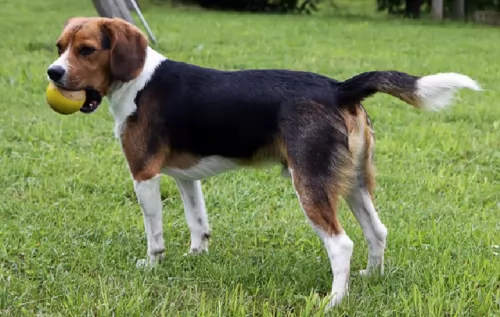 The Beaglier beginnings are set in Australia. Before around 30 years, breeders cross-breed the Beagle and the Cavalier King Charles Spaniel. The result actually turned out great – new we have a small sized breed with a wonderful, soft coat, very likeable looks, the calm and gentle dog which is very active despite his relaxed nature. They can be found around the globe nowadays and they are very popular because of their sweet nature.
The Beaglier beginnings are set in Australia. Before around 30 years, breeders cross-breed the Beagle and the Cavalier King Charles Spaniel. The result actually turned out great – new we have a small sized breed with a wonderful, soft coat, very likeable looks, the calm and gentle dog which is very active despite his relaxed nature. They can be found around the globe nowadays and they are very popular because of their sweet nature.
The Molossus has always been a popular dog and they have been around since ancient times. Mastiff type dogs are termed as Molossus.
Of course, when looking at the origin of the dog, there are many unsubstantiated claims about it. It has always been believed that the Molossus was a Mastiff-type dog, ferocious in battle. The Romans were dog breeders and recognized that the Molossus was a talented dog – good at guarding and herding.
Over the centuries the dog has changed but it is believed it was a Mastiff-type dog with a number of other breeds included in its origins such as the Rottweiler, Pug, Bulldog, Great Dane, Alano Espanol and Saint Bernard.
The Molossus isn’t a dog breed itself but rather a category that other dogs belong to. Today there are Molosser clubs and Molosser shows around the world.
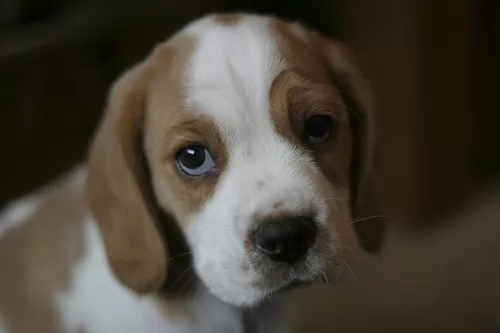 This small dog breed, called Beaglier and Beagler, has the look of his parents. Sometimes, they look more like the Spaniel, and sometimes they look more like the Beagle. This actually means that they are usually small, but can be, in some cases, even medium sized dog. They are usually tricoloured and in most cases, they have dark brown and cream hairs with white markings. They have longer ears, sometimes with more hairs if they look more like the Spaniel. They have large, dark brown eyes and usually dark nose. This breed is very loving and affectionate. They have a high need for a daily activity and they are the best choice for families with children.
This small dog breed, called Beaglier and Beagler, has the look of his parents. Sometimes, they look more like the Spaniel, and sometimes they look more like the Beagle. This actually means that they are usually small, but can be, in some cases, even medium sized dog. They are usually tricoloured and in most cases, they have dark brown and cream hairs with white markings. They have longer ears, sometimes with more hairs if they look more like the Spaniel. They have large, dark brown eyes and usually dark nose. This breed is very loving and affectionate. They have a high need for a daily activity and they are the best choice for families with children.
This Ancient dog breed from Greece has different descriptions of what it really looked like. It seems to have always been large to medium sized dog standing in the region of 50 to 76cm in height and weighing anything from 25 to 55kg.
The coat is mostly short and smooth and can be in a host of different colors. They are large boned dogs, solidly built with medium sized floppy ears, a short, thick neck, short, broad muzzle and a long tail which was later docked.
Molossers typically have heavy bones, pendant ears, and a relatively short and well-muscled neck, with a short, broad muzzle. These Molossers have always been used for a variety of jobs where strength, perseverance, speed and braveness are required. They have been used as rescue- and guard dogs, protecting livestock from predators.
The Molossus dogs all have the same kind of characteristics which have been bred into them. From their working days, they are known for their tremendous courage, taking on wild animals to protect their livestock.
They are territorial, wanting to protect their human family and home from intruders.They have also been bred to be loyal, loving family pets, and being highly affectionate, they want to be involved in the activities of the family.
This breed is gentle and loving, social and active and gets on well with other pets in the home as well as with children. They’re intelligent dogs and will need to be trained and socialized to ensure they are obedient and amicable with visitors to the home.
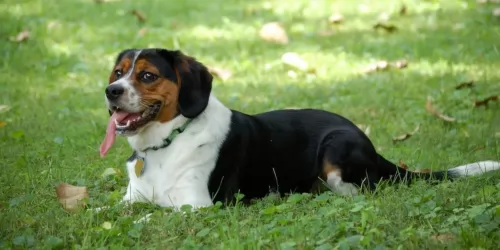 If you decide to bring a Beaglier to your family, it will be the best that you wait for your children to grow up a little bit. They are great to play buddy, but they get carried with the game and they can be very careless during the play. They fit perfectly with the children above the age of 5. They will run, jump, and do whatever your kid is about to do. They are friendly towards children they don’t know but they don’t do well with other animals they don’t know.
If you decide to bring a Beaglier to your family, it will be the best that you wait for your children to grow up a little bit. They are great to play buddy, but they get carried with the game and they can be very careless during the play. They fit perfectly with the children above the age of 5. They will run, jump, and do whatever your kid is about to do. They are friendly towards children they don’t know but they don’t do well with other animals they don’t know.
watchdog
One the main reasons why Beagliers are so much popular lay in their adaptability to any living conditions. They will fit in instantly in a family with children, but they will be happy as well if they live with just one person or even seniors. They can live indoors, houses and apartments without the yard. The Beaglier will enjoy the city parks, dog parks, beach, walking down the crowded streets. This breed is a not a quiet one – they will bark every time they notice something just to let you know. But, they are not aggressive type and they usually bark to communicate with people.
Usually, they are trained very easy. They have a stubborn nature, and if you learn how to get over with this temperament, you will be able to train and raise the sweetest dog ever. They should be trained and socialized while they are still puppies. Since they like too much, the best advice is to use treats to teach them everything that they will need to know. But, be careful with the feeding after the treats – Beagliers get easily obese if they are overfed.
The Molossus, contrary to what many people think, isn’t a vicious dog, but rather a good natured dog that makes a wonderful family pet.
These dogs are known also for being hard working dogs with characteristics of bravery. They are dogs who may look fairly tough, but they are actually gentle, calm and sensitive. It’s a bad upbringing from the owners that gives any dog bad characteristics.
Train your Molossus, have him socialized and be a responsible and loving dog owner, and these dogs promise to make you a splendid family pet.
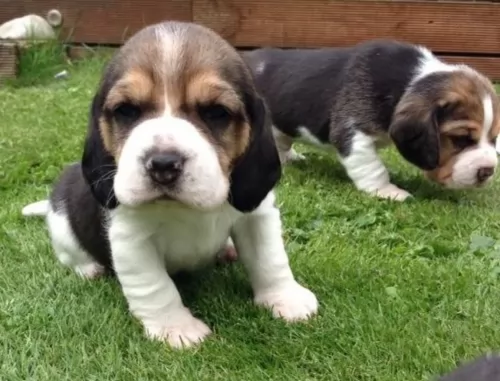 The Beaglier flap ears can be a very great place for the fungi, bacteria and dirt. You will have to clean their ears with an ear cleaning solution and a soft tissue once a week, especially if your pet is playing outside.
The Beaglier flap ears can be a very great place for the fungi, bacteria and dirt. You will have to clean their ears with an ear cleaning solution and a soft tissue once a week, especially if your pet is playing outside.
Cherry eye: Starts as redness in the corner of the eye. Happens when the third eyelid gland slips out of its place and show up as a red blob in the corner of the eye. Sometimes, the gland gets back to its original place in a couple of days, but it will be the best if you can take your dog to the vet as soon as you notice any readiness in his eyes.
Glaucoma: Happens because of the high eye pressure. This affects the normal outflow of the eye fluids and can cause blindness if not treated. It is the best to for your beagle to regular eye checks since this condition is not easy to diagnose in the begging.
These large dogs are particularly prone to health issues such as hip dysplasia, a genetic condition. A poor diet as well as environmental factors can contribute towards the disease too as well as rapid weight gain and obesity.
This disease develops because the dog’s hip joints haven’t developed properly. The hips then partially dislocate, and the dog has pain and battles to get around. If your dog shows signs of hip dysplasia, he will need to get to the vet to do a physical exam and come up with a treatment- and management program.
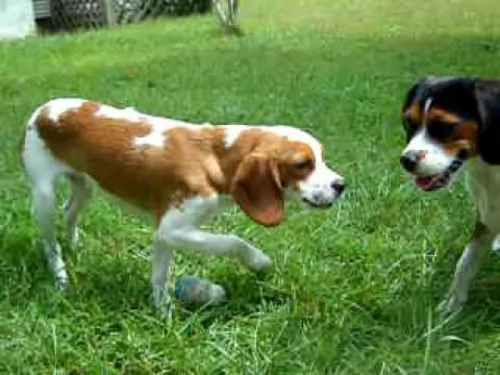 If you are not sure about the dog food you should give to your Beaglier considering the living environment and the lifestyle, it is always the best option to listen to the vet’s advice. They are prone to the obesity so you should keep a schedule that won’t be changed much. Feed them every day at the same time, no more than two meals per day once they get older than 6 months.
If you are not sure about the dog food you should give to your Beaglier considering the living environment and the lifestyle, it is always the best option to listen to the vet’s advice. They are prone to the obesity so you should keep a schedule that won’t be changed much. Feed them every day at the same time, no more than two meals per day once they get older than 6 months.
If you want your Beaglier to be happy, make sure you groom him daily. You will need about 5 minutes per day to brush him and keep him out of the tangles. Bathe then once in a month, that will be enough. Clip their nails regularly. Keep their ears cleaned.
They need a daily activity or they will get destructive. Be careful with the feeding since they get obese very quickly.
Since they are natural hunters, they will like to play chase. You can take them to the woods for a walk or for a run but make sure you train them to respond to your commands before you take them off the leash. They are very curious and they will easily wander off. They can be taught to play inside the house as well. They love to explore new areas so it will be great if you can take them with you for a holiday.
These dogs were bred to be working dogs and they have always spent their time outdoors performing a guarding or rescue role. Today they require a lot of exercise – walks and ball games – as they are dogs with a lot of energy.
Essentially a large breed, the Molossus will need a commercially manufactured food of high quality if you opt to make use of the convenience of these foods.
Make sure to choose one manufactured for large breeds and which is free of a host of bad ingredients such as corn, soy, wheat, dairy, artificial colors, sweeteners and preservatives.
You want dog food which is high in protein and fat. Try and include some home-cooked food such as boiled chicken, brown rice, pasta and vegetables. An ingredient to look out for in your dog’s food is omega-3 fatty acid to help keep the skin and coat shiny and healthy. Puppies particularly benefit from DHA, or Docosahexaenoic acid, a form of omega-3 fatty acid that is good for brain development.
Brushing the dog’s coat twice a week will be necessary to remove loose hairs, especially during the shedding period. When you brush him, check for ticks and fleas and speak to your vet about flea treatment if necessary. Ears and eyes should be checked and cleaned regularly.